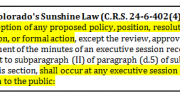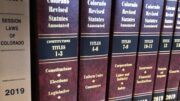Note: This commentary originally appeared in The Denver Post on Mar. 11, 2016. It is reprinted here with permission from the author and The Post.
By Steve Zansberg
CFOIC President
Sen. John Kefalas and Rep. Dan Pabon deserve thanks from all Coloradans for their valiant, but unsuccessful, effort to guarantee the public’s right to inspect its records. These two legislators introduced SB 16-037, which would have clarified that Coloradans enjoy the right to obtain copies of public records in the same digitized format in which government maintains those records.
Our tax dollars pay public servants to carry out the people’s business, including creating and keeping public records — our records — on our behalf. These public employees are the custodians of our records, and the Colorado Open Records Act (CORA) says so. Indeed, CORA provides us all the right to access those public records; not merely the data or information contained in them, but the very writings we have paid our government officials to create and maintain for us.

Steve Zansberg
Nevertheless, several government agencies have refused to provide access to digitized records in digital form, arguing that CORA does not guarantee access to public records in a specific format.
In response to a recent records request from Rocky Mountain PBS, the city of Aurora is demanding $290 to print out a 1,100-page database that the city admits it could transmit in less than two minutes via e-mail. While other jurisdictions produced such a digital file at no cost, Aurora says the law does not require it to produce digital records, and it chooses not to.
In fact, CORA presently states that records “kept only in a miniaturized or digital form, whether on magnetic or optical discs, tapes … or otherwise” must be provided to the public without “unnecessary delay or unnecessary cost.” Among the means by which such public records are to be made available, the statute lists “the provision of portable disk copies of computer files or direct electronic access via on-line bulletin boards or other means.” Obviously, receiving such records in digitized form is cheaper and more efficient than having to scan in paper printouts and re-assemble a database that already exists. Access to manipulable digitized data files also allows reporters and the public to compare data sets easily and to discover patterns that often reveal larger truths.
Sadly, SB 16-037, which would have made this existing duty even more explicit and unequivocal, was voted down in committee.
Hopefully, further discussions between public access advocates and governmental records custodians will result in a revised version of the bill next legislative term. And even without the additional clarifying language, the custodians of the public’s records will comply with their existing statutory duty to provide public access to digitized records without “unreasonable delay or unreasonable cost.”
Steve Zansberg is an attorney with Levine Sullivan Koch & Schulz in Denver.
Follow the Colorado Freedom of Information Coalition on Twitter @CoFOIC. Like CFOIC’s Facebook page. Do you appreciate the information and resources provided by CFOIC? Please consider making a tax-deductible donation.




